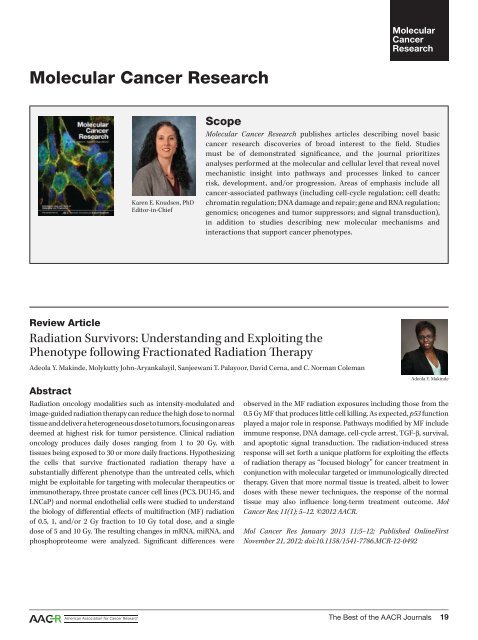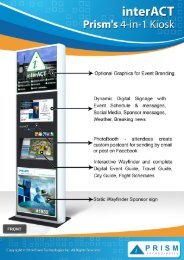Best of AACR Journals
Create successful ePaper yourself
Turn your PDF publications into a flip-book with our unique Google optimized e-Paper software.
Molecular<br />
Cancer<br />
Research<br />
Molecular Cancer Research<br />
Karen E. Knudsen, PhD<br />
Editor-in-Chief<br />
Scope<br />
Molecular Cancer Research publishes articles describing novel basic<br />
cancer research discoveries <strong>of</strong> broad interest to the field. Studies<br />
must be <strong>of</strong> demonstrated significance, and the journal prioritizes<br />
analyses performed at the molecular and cellular level that reveal novel<br />
mechanistic insight into pathways and processes linked to cancer<br />
risk, development, and/or progression. Areas <strong>of</strong> emphasis include all<br />
cancer-associated pathways (including cell-cycle regulation; cell death;<br />
chromatin regulation; DNA damage and repair; gene and RNA regulation;<br />
genomics; oncogenes and tumor suppressors; and signal transduction),<br />
in addition to studies describing new molecular mechanisms and<br />
interactions that support cancer phenotypes.<br />
Review Article<br />
Radiation Survivors: Understanding and Exploiting the<br />
Phenotype following Fractionated Radiation Therapy<br />
Adeola Y. Makinde, Molykutty John-Aryankalayil, Sanjeewani T. Palayoor, David Cerna, and C. Norman Coleman<br />
Abstract<br />
Radiation oncology modalities such as intensity-modulated and<br />
image-guided radiation therapy can reduce the high dose to normal<br />
tissue and deliver a heterogeneous dose to tumors, focusing on areas<br />
deemed at highest risk for tumor persistence. Clinical radiation<br />
oncology produces daily doses ranging from 1 to 20 Gy, with<br />
tissues being exposed to 30 or more daily fractions. Hypothesizing<br />
the cells that survive fractionated radiation therapy have a<br />
substantially different phenotype than the untreated cells, which<br />
might be exploitable for targeting with molecular therapeutics or<br />
immunotherapy, three prostate cancer cell lines (PC3, DU145, and<br />
LNCaP) and normal endothelial cells were studied to understand<br />
the biology <strong>of</strong> differential effects <strong>of</strong> multifraction (MF) radiation<br />
<strong>of</strong> 0.5, 1, and/or 2 Gy fraction to 10 Gy total dose, and a single<br />
dose <strong>of</strong> 5 and 10 Gy. The resulting changes in mRNA, miRNA, and<br />
phosphoproteome were analyzed. Significant differences were<br />
Adeola Y. Makinde<br />
observed in the MF radiation exposures including those from the<br />
0.5 Gy MF that produces little cell killing. As expected, p53 function<br />
played a major role in response. Pathways modified by MF include<br />
immune response, DNA damage, cell-cycle arrest, TGF-β, survival,<br />
and apoptotic signal transduction. The radiation-induced stress<br />
response will set forth a unique platform for exploiting the effects<br />
<strong>of</strong> radiation therapy as “focused biology” for cancer treatment in<br />
conjunction with molecular targeted or immunologically directed<br />
therapy. Given that more normal tissue is treated, albeit to lower<br />
doses with these newer techniques, the response <strong>of</strong> the normal<br />
tissue may also influence long-term treatment outcome. Mol<br />
Cancer Res; 11(1); 5–12. ©2012 <strong>AACR</strong>.<br />
Mol Cancer Res January 2013 11:5–12; Published OnlineFirst<br />
November 21, 2012; doi:10.1158/1541-7786.MCR-12-0492<br />
The <strong>Best</strong> <strong>of</strong> the <strong>AACR</strong> <strong>Journals</strong> 19



